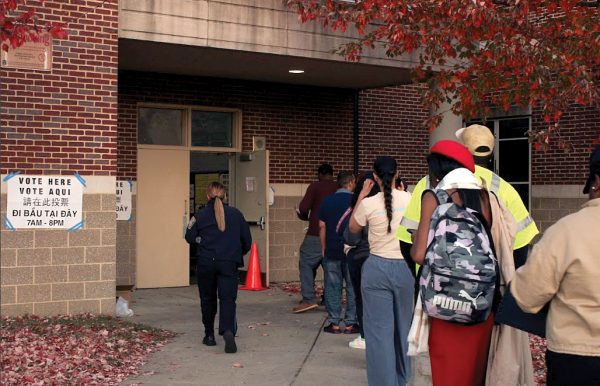December 11, 2024

Voters are shown lined up outside the Lilla G. Frederick School on Columbia Road in Dorchester on Election Day, Nov. 5, 2024.
Maya Maroni/The Scope photo
A cascade of problems with Boston’s general election on Nov. 5 from ballot shortages to a flood of phone calls stemmed from a single math error.
That was the explanation Election Department officials gave on Dec. 6 at a hearing of the Boston City Council’s Committee of the Whole.
Taking the blame for the miscalculation was Head Assistant Registrar of Voters Sabino Piemonte, who told panel members that instead of subtracting the number of returned early and absentee ballots to determine the remaining pool of eligible voters, he made the subtraction twice. Supplying enough ballots for an estimated 80 percent of the estimated remainder, he explained, resulted in shortages.
The head of the department and chair of the board for Boston’s Election Commission, Eneida Tavares, said there were shortages at about 14 locations. She also cited problems with the size of the boxes for containing ballots, and with the electronic tabulators for ballots at polling places.
“We received over 15,000 calls, and we also experienced a large number of machine breakdown issues,” Tavares said, “so the machine breakdown issues, coupled with the ballot issues, just caused a large influx of calls.”
Among the callers failing to get through was the state agency that oversees elections under Secretary of the Commonwealth William F. Galvin.
On Nov. 12, Galvin announced an investigation of “irregularities” in Boston’s election. Eighteen years ago, he placed the city’s Election Department under receivership, following ballot shortages and long waits for voters in the 2006 state election.
City election officials credited the Boston Police Dept. with help in distribution of additional ballots. Not specified was how long it took to get from reports of isolated ballot shortages to the realization of a general problem. But District 6 (West Roxbury/Jamaica Plain) Councillor Ben Weber said he was first alerted about a ballot shortage in Ward 20 around 10 a.m. on election day. He also asked whether voting problems could be reported to the Election Department in other ways, such as email or text messaging.
Piemonte told councillors about one change that will be followed in future elections: Providing enough ballots at each polling place for 100 percent of the expected turnout. According to Tavares, the decision to distribute a smaller percentage “was just based on the capacity of the ballot boxes.”
Tavares also acknowledged that a new tabulator model would be faster, but she noted that the current machines—dating to 2019—could only be replaced through a bidding process with a request for proposals.
At the Dec. 6 hearing, District 2 (South Boston, South End, Chinatown) Councillor Ed Flynn reiterated his call for placing the Election Department under receivership. But his resolution calling for that action failed to win approval at a council meeting last month.
In public testimony, Ed Shoemaker, the executive director of Voter Choice Massachusetts, denounced criticism of city election officials as “unwarranted and unfair. The ballot shortages during the 2024 election were a logistical miscalculation, not a reflection of incompetence or systemic failure,” he said, adding: “The department is already taking steps necessary to ensure such issues do not occur, including adopting a data-driven planning model of improving communication channels with polling locations.”


